Criminal Law Assignment: Exploring Legal Concepts and Privacy Issues
VerifiedAdded on 2022/08/20
|11
|2547
|15
Homework Assignment
AI Summary
This criminal law assignment solution addresses key legal concepts and questions related to criminal procedure and constitutional law. The assignment begins by defining numerous legal terms, including abandoned property, affiant, affidavit, anticipatory search warrant, and many others, providing a comprehensive glossary of relevant vocabulary. The core of the assignment involves answering questions about the rationale behind the 'search incident to arrest' exception to the warrant requirement, along with the limitations imposed by the courts on such searches. It also delves into the complex issue of reasonable expectations of privacy concerning high-tech surveillance devices, such as infrared detectors, and the implications for law enforcement. Furthermore, the assignment explores the exclusionary rule, its justifications, and potential alternatives such as the Patriot Act and the 'fruit of the poisonous tree' doctrine, providing arguments for and against their application in various scenarios, including serious crimes. The role of the good-faith exception is also discussed in relation to the exclusionary rule. Finally, the assignment provides definitions for the 'Fruits of the Poisonous Tree Doctrine'.
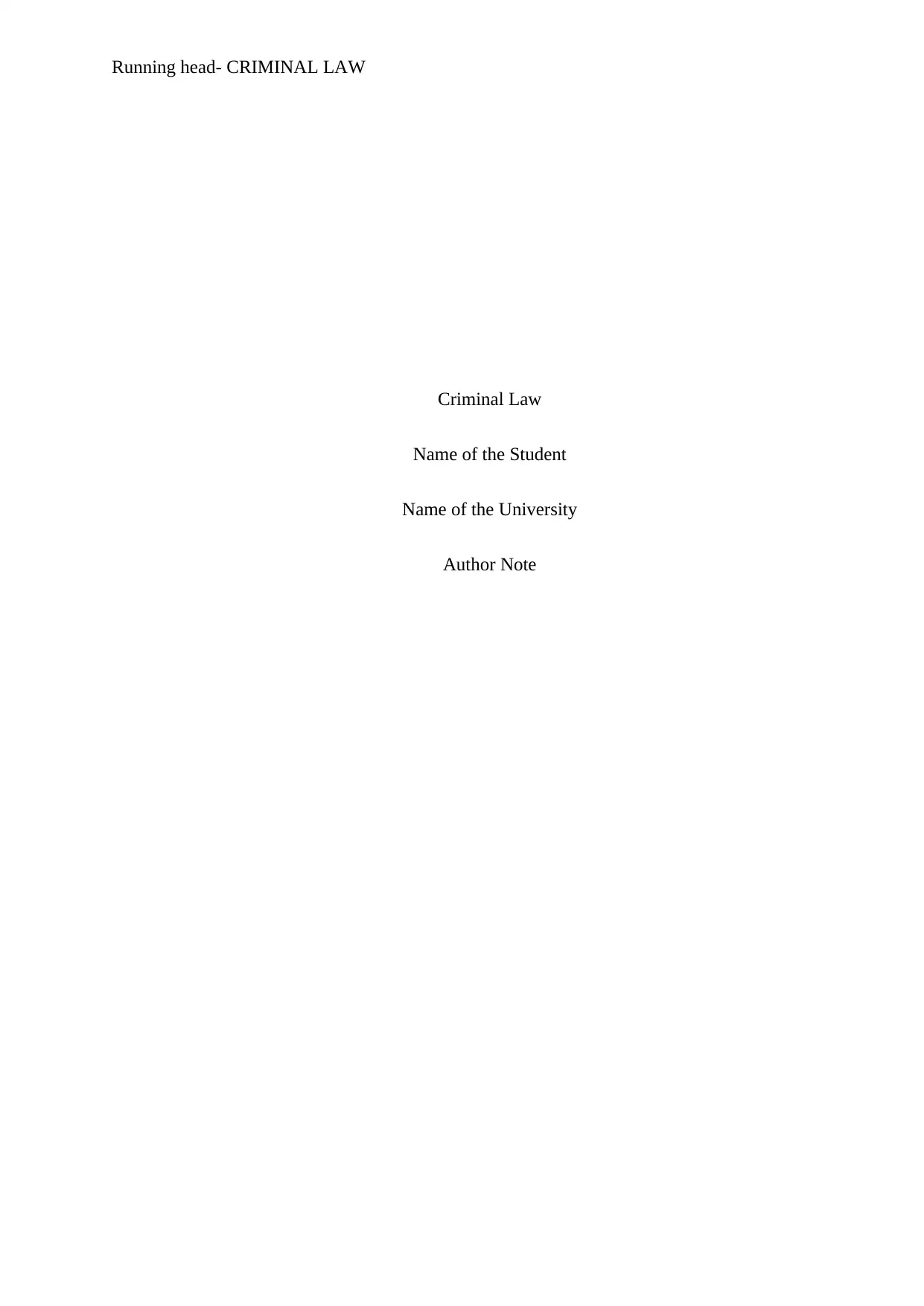
Running head- CRIMINAL LAW
Criminal Law
Name of the Student
Name of the University
Author Note
Criminal Law
Name of the Student
Name of the University
Author Note
Paraphrase This Document
Need a fresh take? Get an instant paraphrase of this document with our AI Paraphraser
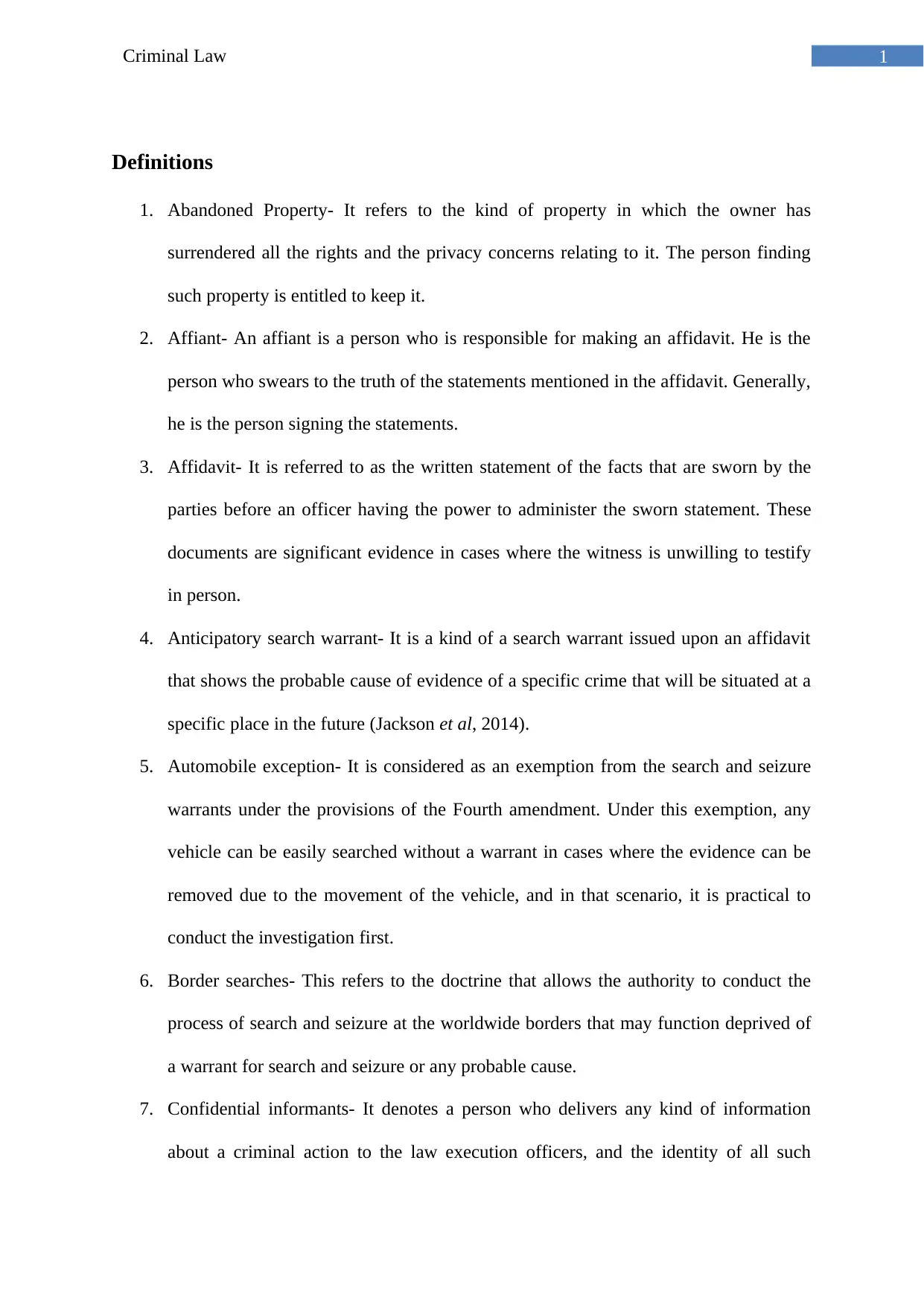
1Criminal Law
Definitions
1. Abandoned Property- It refers to the kind of property in which the owner has
surrendered all the rights and the privacy concerns relating to it. The person finding
such property is entitled to keep it.
2. Affiant- An affiant is a person who is responsible for making an affidavit. He is the
person who swears to the truth of the statements mentioned in the affidavit. Generally,
he is the person signing the statements.
3. Affidavit- It is referred to as the written statement of the facts that are sworn by the
parties before an officer having the power to administer the sworn statement. These
documents are significant evidence in cases where the witness is unwilling to testify
in person.
4. Anticipatory search warrant- It is a kind of a search warrant issued upon an affidavit
that shows the probable cause of evidence of a specific crime that will be situated at a
specific place in the future (Jackson et al, 2014).
5. Automobile exception- It is considered as an exemption from the search and seizure
warrants under the provisions of the Fourth amendment. Under this exemption, any
vehicle can be easily searched without a warrant in cases where the evidence can be
removed due to the movement of the vehicle, and in that scenario, it is practical to
conduct the investigation first.
6. Border searches- This refers to the doctrine that allows the authority to conduct the
process of search and seizure at the worldwide borders that may function deprived of
a warrant for search and seizure or any probable cause.
7. Confidential informants- It denotes a person who delivers any kind of information
about a criminal action to the law execution officers, and the identity of all such
Definitions
1. Abandoned Property- It refers to the kind of property in which the owner has
surrendered all the rights and the privacy concerns relating to it. The person finding
such property is entitled to keep it.
2. Affiant- An affiant is a person who is responsible for making an affidavit. He is the
person who swears to the truth of the statements mentioned in the affidavit. Generally,
he is the person signing the statements.
3. Affidavit- It is referred to as the written statement of the facts that are sworn by the
parties before an officer having the power to administer the sworn statement. These
documents are significant evidence in cases where the witness is unwilling to testify
in person.
4. Anticipatory search warrant- It is a kind of a search warrant issued upon an affidavit
that shows the probable cause of evidence of a specific crime that will be situated at a
specific place in the future (Jackson et al, 2014).
5. Automobile exception- It is considered as an exemption from the search and seizure
warrants under the provisions of the Fourth amendment. Under this exemption, any
vehicle can be easily searched without a warrant in cases where the evidence can be
removed due to the movement of the vehicle, and in that scenario, it is practical to
conduct the investigation first.
6. Border searches- This refers to the doctrine that allows the authority to conduct the
process of search and seizure at the worldwide borders that may function deprived of
a warrant for search and seizure or any probable cause.
7. Confidential informants- It denotes a person who delivers any kind of information
about a criminal action to the law execution officers, and the identity of all such
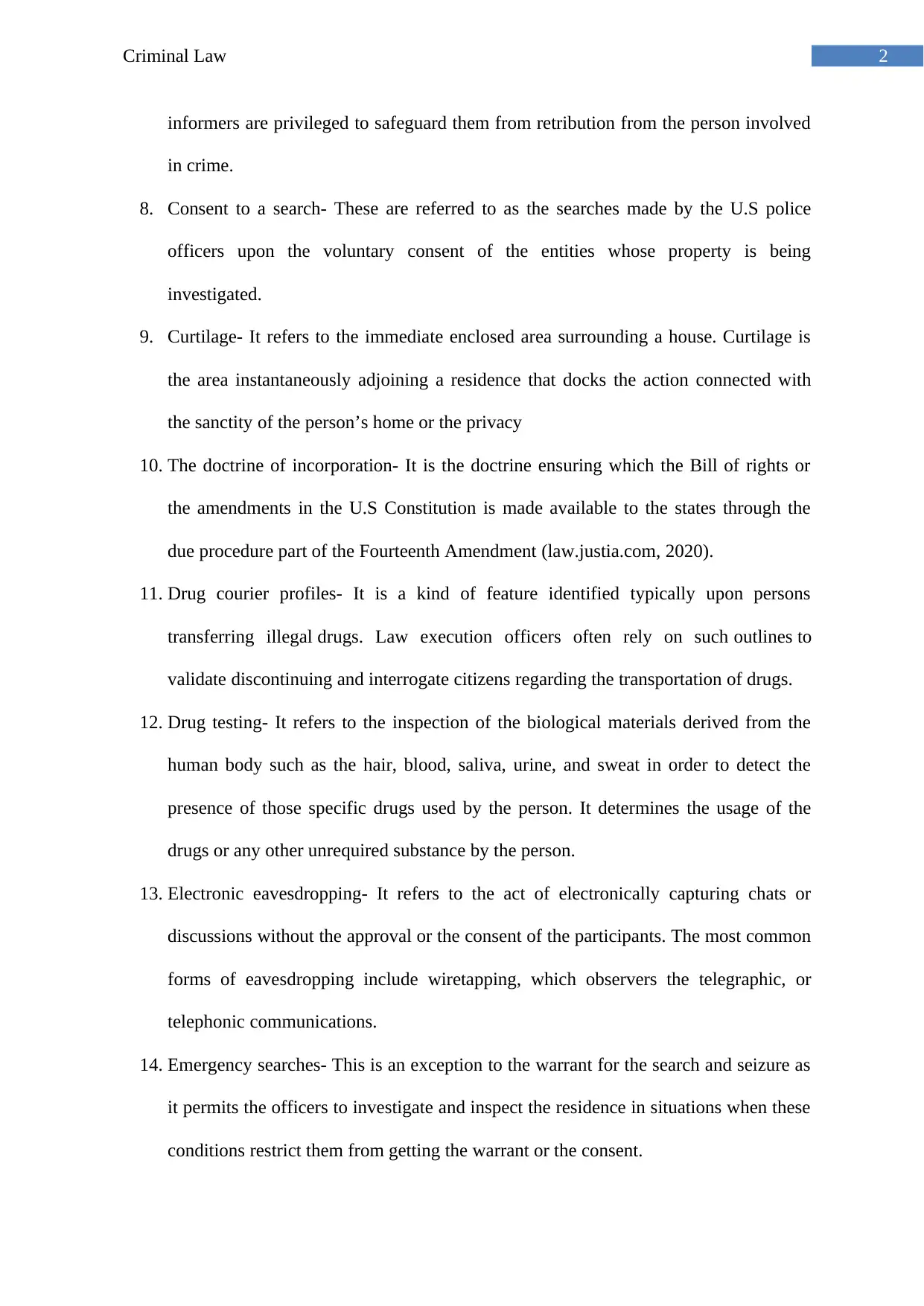
2Criminal Law
informers are privileged to safeguard them from retribution from the person involved
in crime.
8. Consent to a search- These are referred to as the searches made by the U.S police
officers upon the voluntary consent of the entities whose property is being
investigated.
9. Curtilage- It refers to the immediate enclosed area surrounding a house. Curtilage is
the area instantaneously adjoining a residence that docks the action connected with
the sanctity of the person’s home or the privacy
10. The doctrine of incorporation- It is the doctrine ensuring which the Bill of rights or
the amendments in the U.S Constitution is made available to the states through the
due procedure part of the Fourteenth Amendment (law.justia.com, 2020).
11. Drug courier profiles- It is a kind of feature identified typically upon persons
transferring illegal drugs. Law execution officers often rely on such outlines to
validate discontinuing and interrogate citizens regarding the transportation of drugs.
12. Drug testing- It refers to the inspection of the biological materials derived from the
human body such as the hair, blood, saliva, urine, and sweat in order to detect the
presence of those specific drugs used by the person. It determines the usage of the
drugs or any other unrequired substance by the person.
13. Electronic eavesdropping- It refers to the act of electronically capturing chats or
discussions without the approval or the consent of the participants. The most common
forms of eavesdropping include wiretapping, which observers the telegraphic, or
telephonic communications.
14. Emergency searches- This is an exception to the warrant for the search and seizure as
it permits the officers to investigate and inspect the residence in situations when these
conditions restrict them from getting the warrant or the consent.
informers are privileged to safeguard them from retribution from the person involved
in crime.
8. Consent to a search- These are referred to as the searches made by the U.S police
officers upon the voluntary consent of the entities whose property is being
investigated.
9. Curtilage- It refers to the immediate enclosed area surrounding a house. Curtilage is
the area instantaneously adjoining a residence that docks the action connected with
the sanctity of the person’s home or the privacy
10. The doctrine of incorporation- It is the doctrine ensuring which the Bill of rights or
the amendments in the U.S Constitution is made available to the states through the
due procedure part of the Fourteenth Amendment (law.justia.com, 2020).
11. Drug courier profiles- It is a kind of feature identified typically upon persons
transferring illegal drugs. Law execution officers often rely on such outlines to
validate discontinuing and interrogate citizens regarding the transportation of drugs.
12. Drug testing- It refers to the inspection of the biological materials derived from the
human body such as the hair, blood, saliva, urine, and sweat in order to detect the
presence of those specific drugs used by the person. It determines the usage of the
drugs or any other unrequired substance by the person.
13. Electronic eavesdropping- It refers to the act of electronically capturing chats or
discussions without the approval or the consent of the participants. The most common
forms of eavesdropping include wiretapping, which observers the telegraphic, or
telephonic communications.
14. Emergency searches- This is an exception to the warrant for the search and seizure as
it permits the officers to investigate and inspect the residence in situations when these
conditions restrict them from getting the warrant or the consent.
⊘ This is a preview!⊘
Do you want full access?
Subscribe today to unlock all pages.

Trusted by 1+ million students worldwide
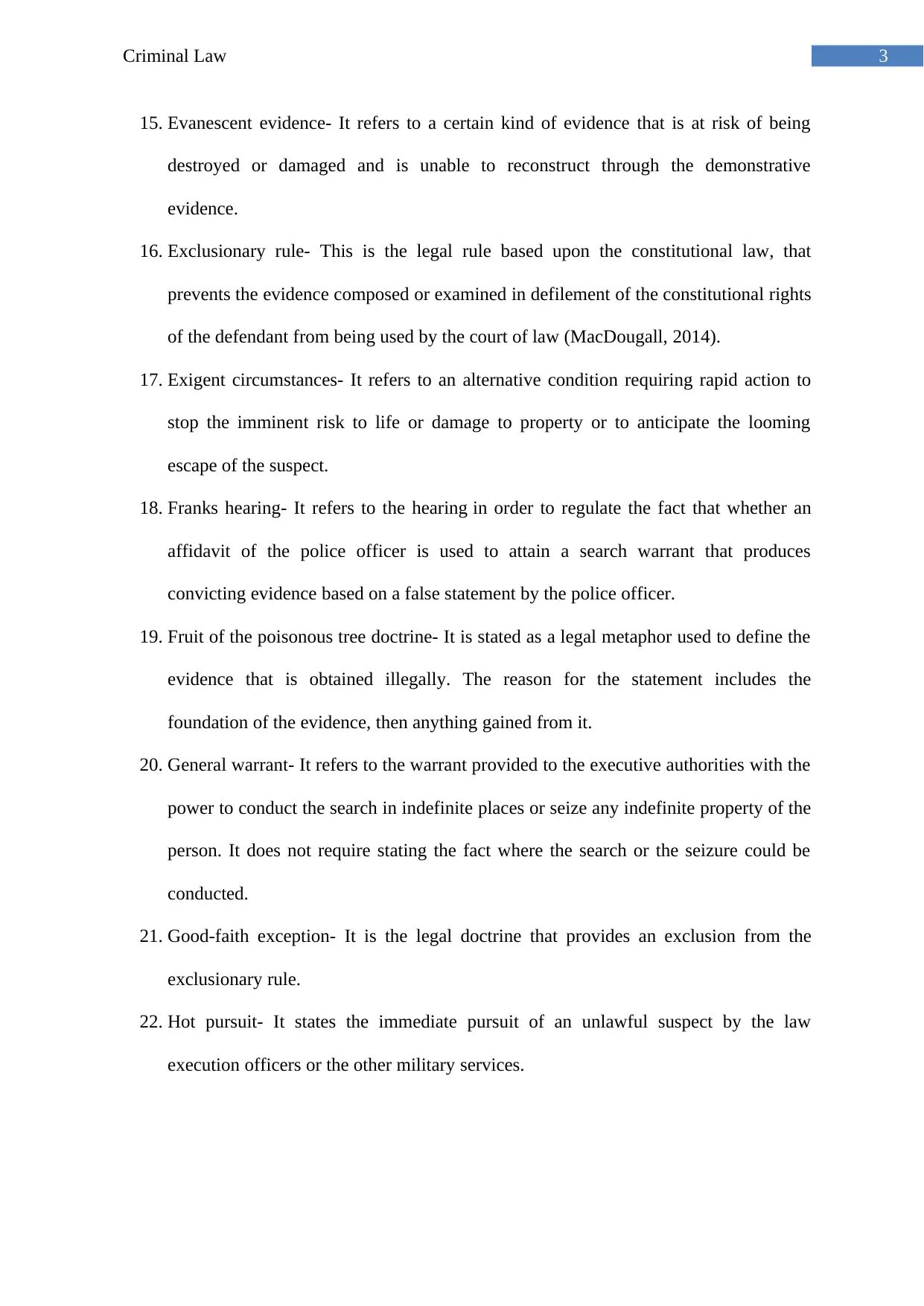
3Criminal Law
15. Evanescent evidence- It refers to a certain kind of evidence that is at risk of being
destroyed or damaged and is unable to reconstruct through the demonstrative
evidence.
16. Exclusionary rule- This is the legal rule based upon the constitutional law, that
prevents the evidence composed or examined in defilement of the constitutional rights
of the defendant from being used by the court of law (MacDougall, 2014).
17. Exigent circumstances- It refers to an alternative condition requiring rapid action to
stop the imminent risk to life or damage to property or to anticipate the looming
escape of the suspect.
18. Franks hearing- It refers to the hearing in order to regulate the fact that whether an
affidavit of the police officer is used to attain a search warrant that produces
convicting evidence based on a false statement by the police officer.
19. Fruit of the poisonous tree doctrine- It is stated as a legal metaphor used to define the
evidence that is obtained illegally. The reason for the statement includes the
foundation of the evidence, then anything gained from it.
20. General warrant- It refers to the warrant provided to the executive authorities with the
power to conduct the search in indefinite places or seize any indefinite property of the
person. It does not require stating the fact where the search or the seizure could be
conducted.
21. Good-faith exception- It is the legal doctrine that provides an exclusion from the
exclusionary rule.
22. Hot pursuit- It states the immediate pursuit of an unlawful suspect by the law
execution officers or the other military services.
15. Evanescent evidence- It refers to a certain kind of evidence that is at risk of being
destroyed or damaged and is unable to reconstruct through the demonstrative
evidence.
16. Exclusionary rule- This is the legal rule based upon the constitutional law, that
prevents the evidence composed or examined in defilement of the constitutional rights
of the defendant from being used by the court of law (MacDougall, 2014).
17. Exigent circumstances- It refers to an alternative condition requiring rapid action to
stop the imminent risk to life or damage to property or to anticipate the looming
escape of the suspect.
18. Franks hearing- It refers to the hearing in order to regulate the fact that whether an
affidavit of the police officer is used to attain a search warrant that produces
convicting evidence based on a false statement by the police officer.
19. Fruit of the poisonous tree doctrine- It is stated as a legal metaphor used to define the
evidence that is obtained illegally. The reason for the statement includes the
foundation of the evidence, then anything gained from it.
20. General warrant- It refers to the warrant provided to the executive authorities with the
power to conduct the search in indefinite places or seize any indefinite property of the
person. It does not require stating the fact where the search or the seizure could be
conducted.
21. Good-faith exception- It is the legal doctrine that provides an exclusion from the
exclusionary rule.
22. Hot pursuit- It states the immediate pursuit of an unlawful suspect by the law
execution officers or the other military services.
Paraphrase This Document
Need a fresh take? Get an instant paraphrase of this document with our AI Paraphraser
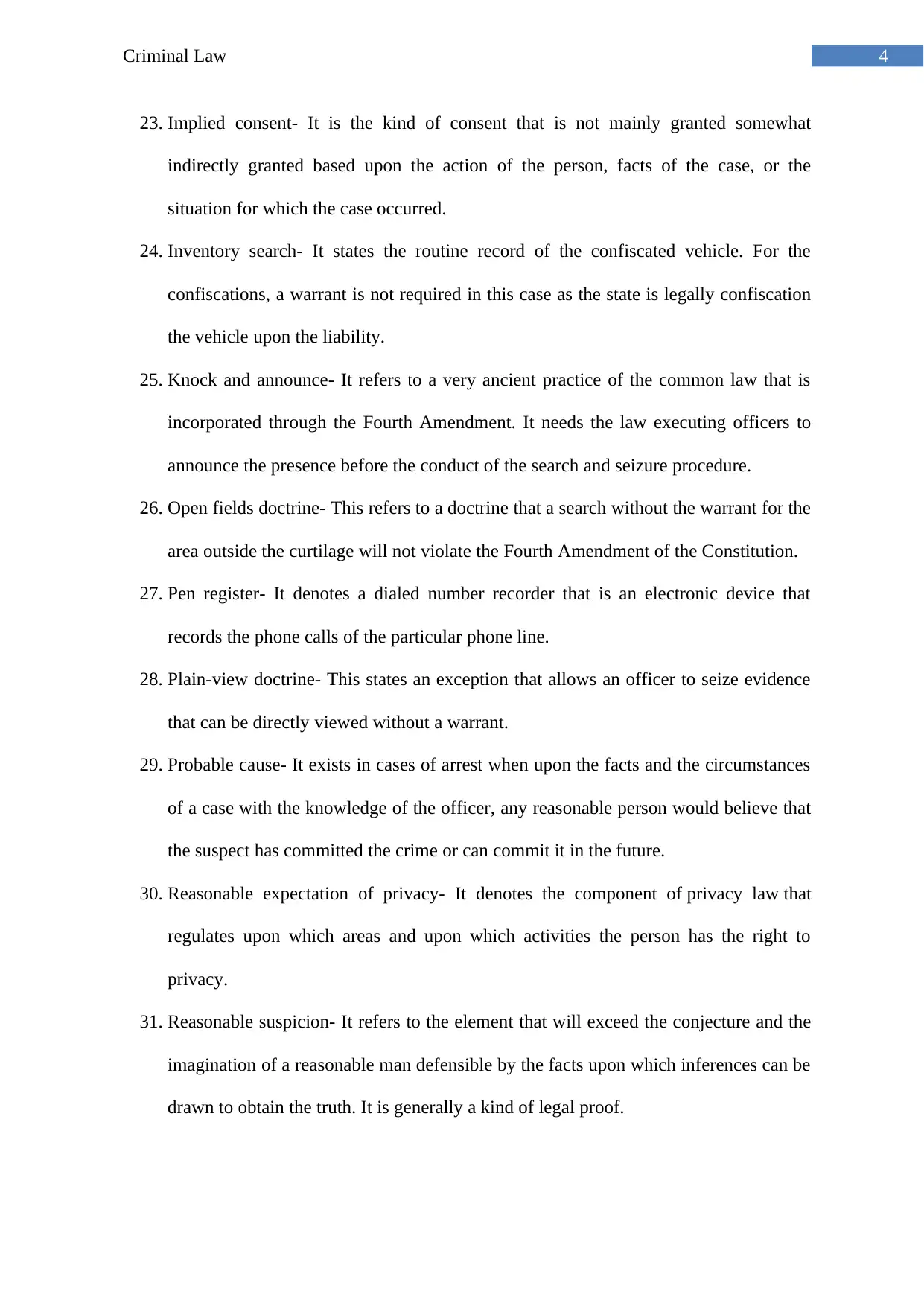
4Criminal Law
23. Implied consent- It is the kind of consent that is not mainly granted somewhat
indirectly granted based upon the action of the person, facts of the case, or the
situation for which the case occurred.
24. Inventory search- It states the routine record of the confiscated vehicle. For the
confiscations, a warrant is not required in this case as the state is legally confiscation
the vehicle upon the liability.
25. Knock and announce- It refers to a very ancient practice of the common law that is
incorporated through the Fourth Amendment. It needs the law executing officers to
announce the presence before the conduct of the search and seizure procedure.
26. Open fields doctrine- This refers to a doctrine that a search without the warrant for the
area outside the curtilage will not violate the Fourth Amendment of the Constitution.
27. Pen register- It denotes a dialed number recorder that is an electronic device that
records the phone calls of the particular phone line.
28. Plain-view doctrine- This states an exception that allows an officer to seize evidence
that can be directly viewed without a warrant.
29. Probable cause- It exists in cases of arrest when upon the facts and the circumstances
of a case with the knowledge of the officer, any reasonable person would believe that
the suspect has committed the crime or can commit it in the future.
30. Reasonable expectation of privacy- It denotes the component of privacy law that
regulates upon which areas and upon which activities the person has the right to
privacy.
31. Reasonable suspicion- It refers to the element that will exceed the conjecture and the
imagination of a reasonable man defensible by the facts upon which inferences can be
drawn to obtain the truth. It is generally a kind of legal proof.
23. Implied consent- It is the kind of consent that is not mainly granted somewhat
indirectly granted based upon the action of the person, facts of the case, or the
situation for which the case occurred.
24. Inventory search- It states the routine record of the confiscated vehicle. For the
confiscations, a warrant is not required in this case as the state is legally confiscation
the vehicle upon the liability.
25. Knock and announce- It refers to a very ancient practice of the common law that is
incorporated through the Fourth Amendment. It needs the law executing officers to
announce the presence before the conduct of the search and seizure procedure.
26. Open fields doctrine- This refers to a doctrine that a search without the warrant for the
area outside the curtilage will not violate the Fourth Amendment of the Constitution.
27. Pen register- It denotes a dialed number recorder that is an electronic device that
records the phone calls of the particular phone line.
28. Plain-view doctrine- This states an exception that allows an officer to seize evidence
that can be directly viewed without a warrant.
29. Probable cause- It exists in cases of arrest when upon the facts and the circumstances
of a case with the knowledge of the officer, any reasonable person would believe that
the suspect has committed the crime or can commit it in the future.
30. Reasonable expectation of privacy- It denotes the component of privacy law that
regulates upon which areas and upon which activities the person has the right to
privacy.
31. Reasonable suspicion- It refers to the element that will exceed the conjecture and the
imagination of a reasonable man defensible by the facts upon which inferences can be
drawn to obtain the truth. It is generally a kind of legal proof.
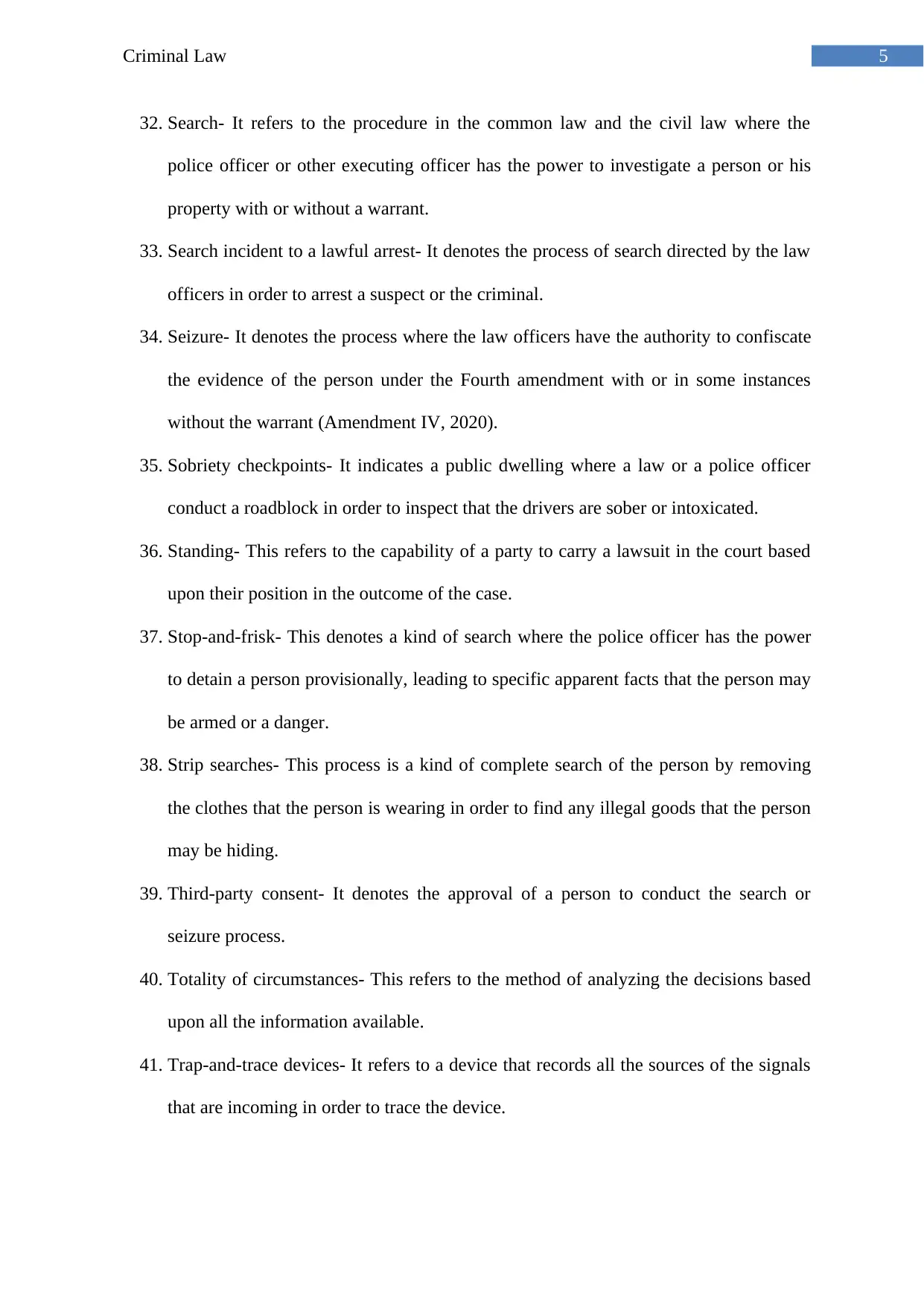
5Criminal Law
32. Search- It refers to the procedure in the common law and the civil law where the
police officer or other executing officer has the power to investigate a person or his
property with or without a warrant.
33. Search incident to a lawful arrest- It denotes the process of search directed by the law
officers in order to arrest a suspect or the criminal.
34. Seizure- It denotes the process where the law officers have the authority to confiscate
the evidence of the person under the Fourth amendment with or in some instances
without the warrant (Amendment IV, 2020).
35. Sobriety checkpoints- It indicates a public dwelling where a law or a police officer
conduct a roadblock in order to inspect that the drivers are sober or intoxicated.
36. Standing- This refers to the capability of a party to carry a lawsuit in the court based
upon their position in the outcome of the case.
37. Stop-and-frisk- This denotes a kind of search where the police officer has the power
to detain a person provisionally, leading to specific apparent facts that the person may
be armed or a danger.
38. Strip searches- This process is a kind of complete search of the person by removing
the clothes that the person is wearing in order to find any illegal goods that the person
may be hiding.
39. Third-party consent- It denotes the approval of a person to conduct the search or
seizure process.
40. Totality of circumstances- This refers to the method of analyzing the decisions based
upon all the information available.
41. Trap-and-trace devices- It refers to a device that records all the sources of the signals
that are incoming in order to trace the device.
32. Search- It refers to the procedure in the common law and the civil law where the
police officer or other executing officer has the power to investigate a person or his
property with or without a warrant.
33. Search incident to a lawful arrest- It denotes the process of search directed by the law
officers in order to arrest a suspect or the criminal.
34. Seizure- It denotes the process where the law officers have the authority to confiscate
the evidence of the person under the Fourth amendment with or in some instances
without the warrant (Amendment IV, 2020).
35. Sobriety checkpoints- It indicates a public dwelling where a law or a police officer
conduct a roadblock in order to inspect that the drivers are sober or intoxicated.
36. Standing- This refers to the capability of a party to carry a lawsuit in the court based
upon their position in the outcome of the case.
37. Stop-and-frisk- This denotes a kind of search where the police officer has the power
to detain a person provisionally, leading to specific apparent facts that the person may
be armed or a danger.
38. Strip searches- This process is a kind of complete search of the person by removing
the clothes that the person is wearing in order to find any illegal goods that the person
may be hiding.
39. Third-party consent- It denotes the approval of a person to conduct the search or
seizure process.
40. Totality of circumstances- This refers to the method of analyzing the decisions based
upon all the information available.
41. Trap-and-trace devices- It refers to a device that records all the sources of the signals
that are incoming in order to trace the device.
⊘ This is a preview!⊘
Do you want full access?
Subscribe today to unlock all pages.

Trusted by 1+ million students worldwide
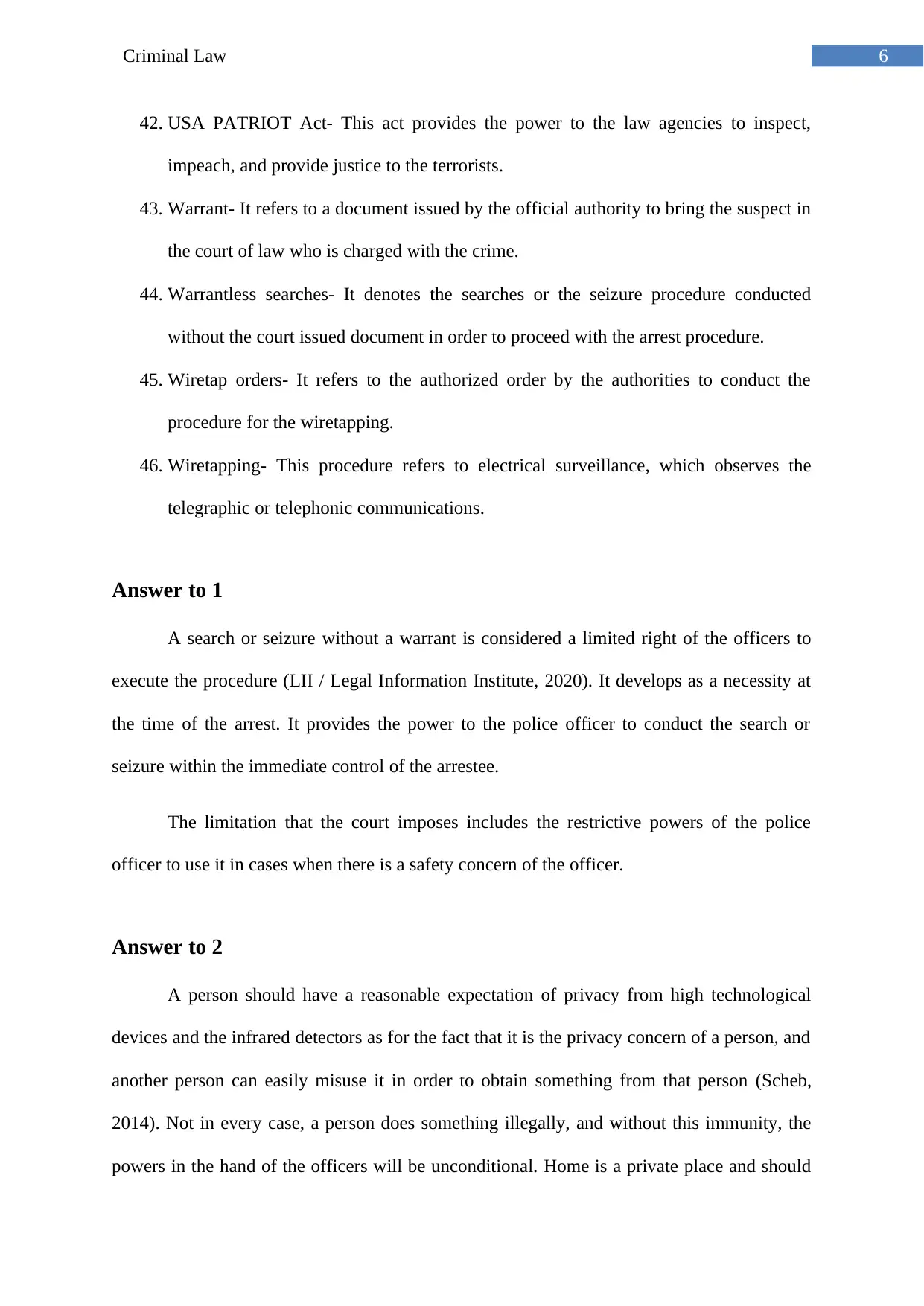
6Criminal Law
42. USA PATRIOT Act- This act provides the power to the law agencies to inspect,
impeach, and provide justice to the terrorists.
43. Warrant- It refers to a document issued by the official authority to bring the suspect in
the court of law who is charged with the crime.
44. Warrantless searches- It denotes the searches or the seizure procedure conducted
without the court issued document in order to proceed with the arrest procedure.
45. Wiretap orders- It refers to the authorized order by the authorities to conduct the
procedure for the wiretapping.
46. Wiretapping- This procedure refers to electrical surveillance, which observes the
telegraphic or telephonic communications.
Answer to 1
A search or seizure without a warrant is considered a limited right of the officers to
execute the procedure (LII / Legal Information Institute, 2020). It develops as a necessity at
the time of the arrest. It provides the power to the police officer to conduct the search or
seizure within the immediate control of the arrestee.
The limitation that the court imposes includes the restrictive powers of the police
officer to use it in cases when there is a safety concern of the officer.
Answer to 2
A person should have a reasonable expectation of privacy from high technological
devices and the infrared detectors as for the fact that it is the privacy concern of a person, and
another person can easily misuse it in order to obtain something from that person (Scheb,
2014). Not in every case, a person does something illegally, and without this immunity, the
powers in the hand of the officers will be unconditional. Home is a private place and should
42. USA PATRIOT Act- This act provides the power to the law agencies to inspect,
impeach, and provide justice to the terrorists.
43. Warrant- It refers to a document issued by the official authority to bring the suspect in
the court of law who is charged with the crime.
44. Warrantless searches- It denotes the searches or the seizure procedure conducted
without the court issued document in order to proceed with the arrest procedure.
45. Wiretap orders- It refers to the authorized order by the authorities to conduct the
procedure for the wiretapping.
46. Wiretapping- This procedure refers to electrical surveillance, which observes the
telegraphic or telephonic communications.
Answer to 1
A search or seizure without a warrant is considered a limited right of the officers to
execute the procedure (LII / Legal Information Institute, 2020). It develops as a necessity at
the time of the arrest. It provides the power to the police officer to conduct the search or
seizure within the immediate control of the arrestee.
The limitation that the court imposes includes the restrictive powers of the police
officer to use it in cases when there is a safety concern of the officer.
Answer to 2
A person should have a reasonable expectation of privacy from high technological
devices and the infrared detectors as for the fact that it is the privacy concern of a person, and
another person can easily misuse it in order to obtain something from that person (Scheb,
2014). Not in every case, a person does something illegally, and without this immunity, the
powers in the hand of the officers will be unconditional. Home is a private place and should
Paraphrase This Document
Need a fresh take? Get an instant paraphrase of this document with our AI Paraphraser
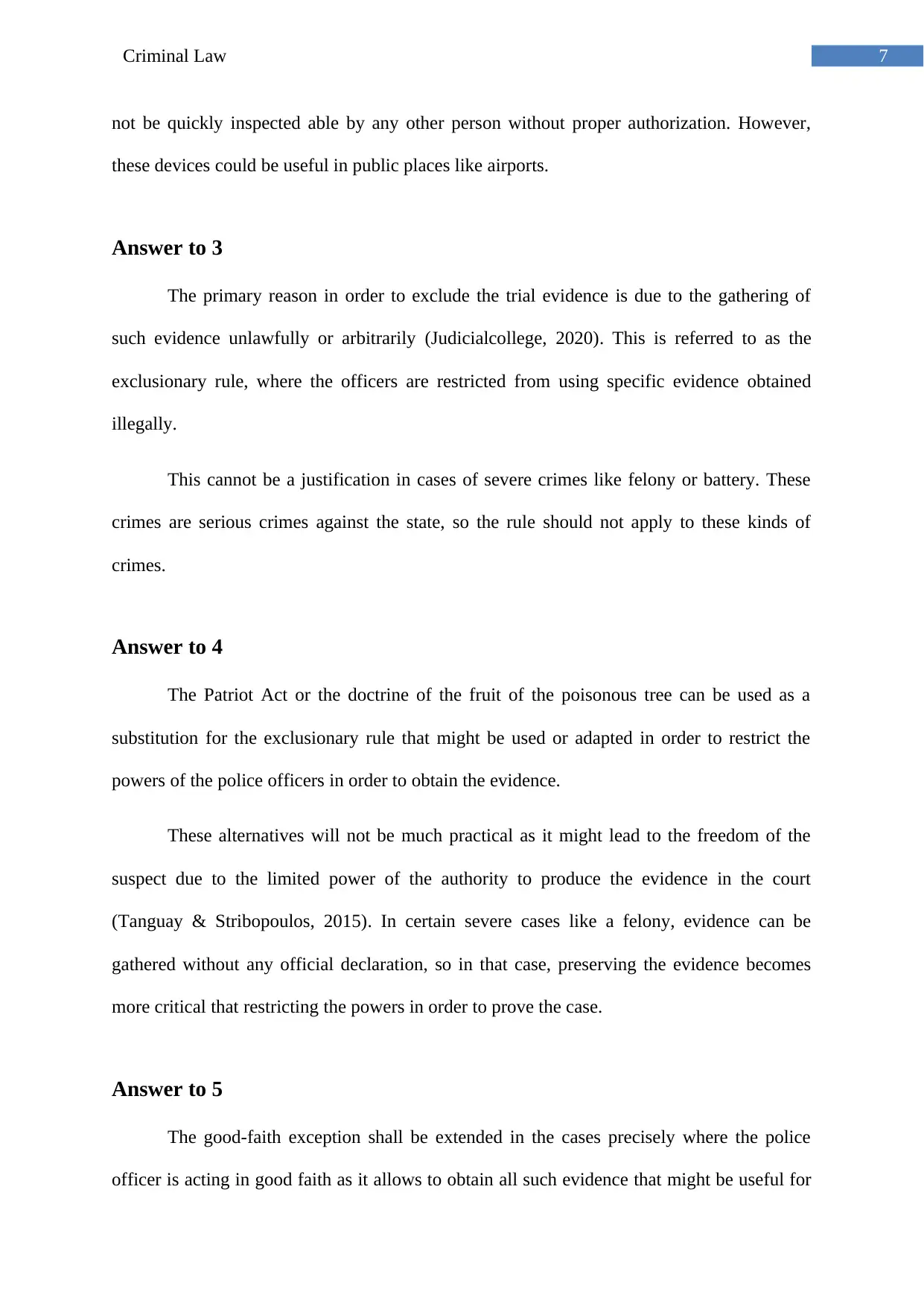
7Criminal Law
not be quickly inspected able by any other person without proper authorization. However,
these devices could be useful in public places like airports.
Answer to 3
The primary reason in order to exclude the trial evidence is due to the gathering of
such evidence unlawfully or arbitrarily (Judicialcollege, 2020). This is referred to as the
exclusionary rule, where the officers are restricted from using specific evidence obtained
illegally.
This cannot be a justification in cases of severe crimes like felony or battery. These
crimes are serious crimes against the state, so the rule should not apply to these kinds of
crimes.
Answer to 4
The Patriot Act or the doctrine of the fruit of the poisonous tree can be used as a
substitution for the exclusionary rule that might be used or adapted in order to restrict the
powers of the police officers in order to obtain the evidence.
These alternatives will not be much practical as it might lead to the freedom of the
suspect due to the limited power of the authority to produce the evidence in the court
(Tanguay & Stribopoulos, 2015). In certain severe cases like a felony, evidence can be
gathered without any official declaration, so in that case, preserving the evidence becomes
more critical that restricting the powers in order to prove the case.
Answer to 5
The good-faith exception shall be extended in the cases precisely where the police
officer is acting in good faith as it allows to obtain all such evidence that might be useful for
not be quickly inspected able by any other person without proper authorization. However,
these devices could be useful in public places like airports.
Answer to 3
The primary reason in order to exclude the trial evidence is due to the gathering of
such evidence unlawfully or arbitrarily (Judicialcollege, 2020). This is referred to as the
exclusionary rule, where the officers are restricted from using specific evidence obtained
illegally.
This cannot be a justification in cases of severe crimes like felony or battery. These
crimes are serious crimes against the state, so the rule should not apply to these kinds of
crimes.
Answer to 4
The Patriot Act or the doctrine of the fruit of the poisonous tree can be used as a
substitution for the exclusionary rule that might be used or adapted in order to restrict the
powers of the police officers in order to obtain the evidence.
These alternatives will not be much practical as it might lead to the freedom of the
suspect due to the limited power of the authority to produce the evidence in the court
(Tanguay & Stribopoulos, 2015). In certain severe cases like a felony, evidence can be
gathered without any official declaration, so in that case, preserving the evidence becomes
more critical that restricting the powers in order to prove the case.
Answer to 5
The good-faith exception shall be extended in the cases precisely where the police
officer is acting in good faith as it allows to obtain all such evidence that might be useful for
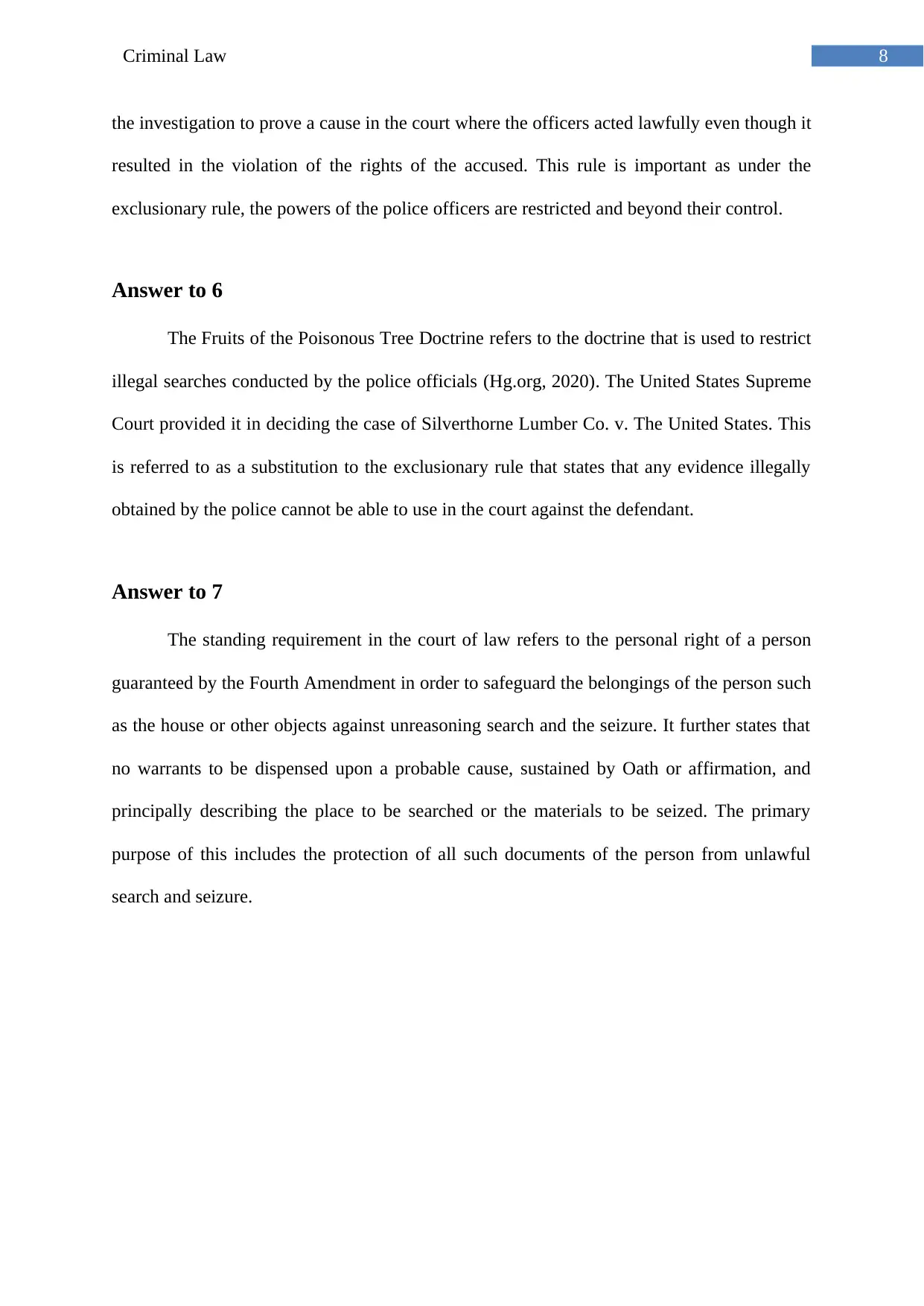
8Criminal Law
the investigation to prove a cause in the court where the officers acted lawfully even though it
resulted in the violation of the rights of the accused. This rule is important as under the
exclusionary rule, the powers of the police officers are restricted and beyond their control.
Answer to 6
The Fruits of the Poisonous Tree Doctrine refers to the doctrine that is used to restrict
illegal searches conducted by the police officials (Hg.org, 2020). The United States Supreme
Court provided it in deciding the case of Silverthorne Lumber Co. v. The United States. This
is referred to as a substitution to the exclusionary rule that states that any evidence illegally
obtained by the police cannot be able to use in the court against the defendant.
Answer to 7
The standing requirement in the court of law refers to the personal right of a person
guaranteed by the Fourth Amendment in order to safeguard the belongings of the person such
as the house or other objects against unreasoning search and the seizure. It further states that
no warrants to be dispensed upon a probable cause, sustained by Oath or affirmation, and
principally describing the place to be searched or the materials to be seized. The primary
purpose of this includes the protection of all such documents of the person from unlawful
search and seizure.
the investigation to prove a cause in the court where the officers acted lawfully even though it
resulted in the violation of the rights of the accused. This rule is important as under the
exclusionary rule, the powers of the police officers are restricted and beyond their control.
Answer to 6
The Fruits of the Poisonous Tree Doctrine refers to the doctrine that is used to restrict
illegal searches conducted by the police officials (Hg.org, 2020). The United States Supreme
Court provided it in deciding the case of Silverthorne Lumber Co. v. The United States. This
is referred to as a substitution to the exclusionary rule that states that any evidence illegally
obtained by the police cannot be able to use in the court against the defendant.
Answer to 7
The standing requirement in the court of law refers to the personal right of a person
guaranteed by the Fourth Amendment in order to safeguard the belongings of the person such
as the house or other objects against unreasoning search and the seizure. It further states that
no warrants to be dispensed upon a probable cause, sustained by Oath or affirmation, and
principally describing the place to be searched or the materials to be seized. The primary
purpose of this includes the protection of all such documents of the person from unlawful
search and seizure.
⊘ This is a preview!⊘
Do you want full access?
Subscribe today to unlock all pages.

Trusted by 1+ million students worldwide
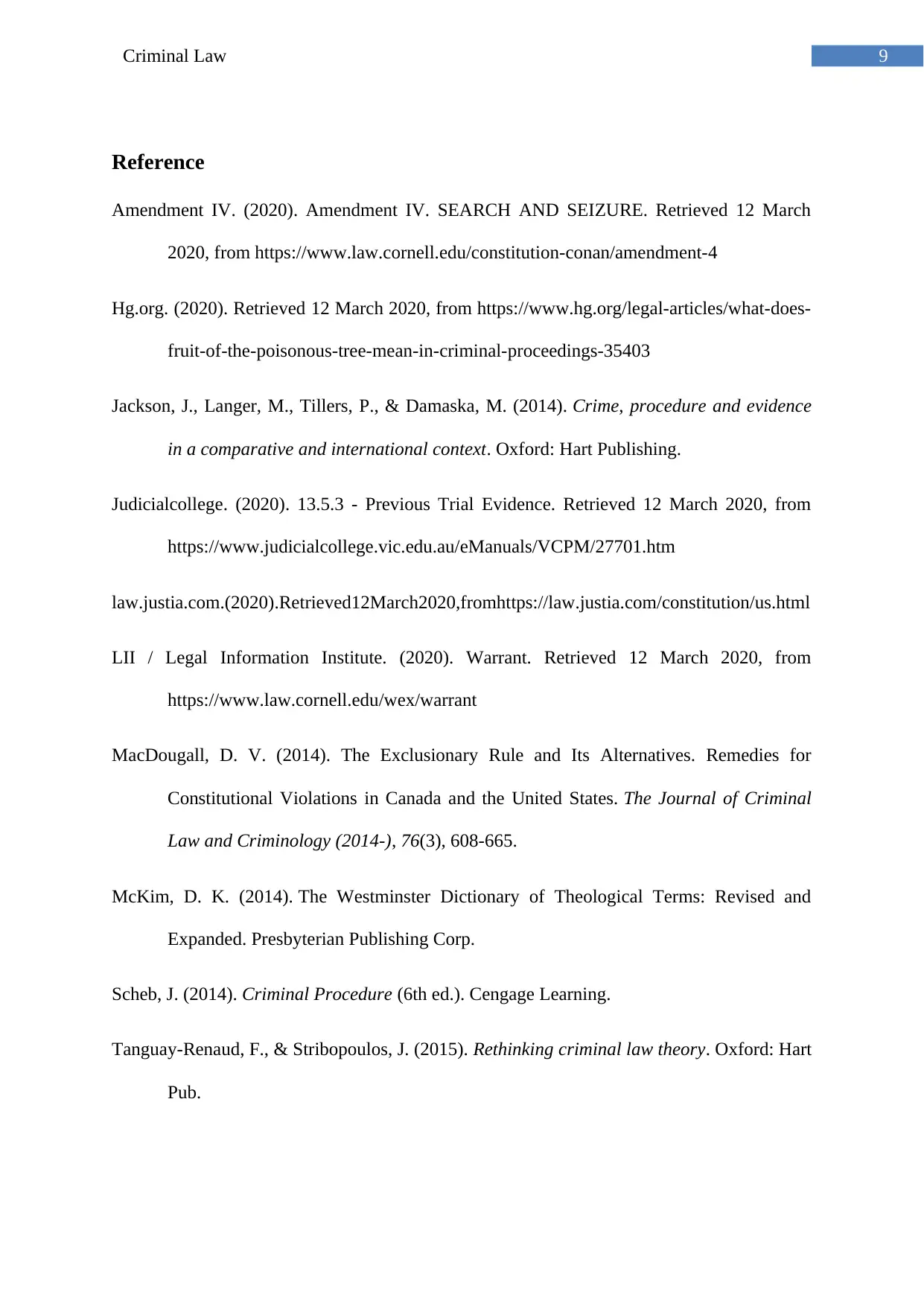
9Criminal Law
Reference
Amendment IV. (2020). Amendment IV. SEARCH AND SEIZURE. Retrieved 12 March
2020, from https://www.law.cornell.edu/constitution-conan/amendment-4
Hg.org. (2020). Retrieved 12 March 2020, from https://www.hg.org/legal-articles/what-does-
fruit-of-the-poisonous-tree-mean-in-criminal-proceedings-35403
Jackson, J., Langer, M., Tillers, P., & Damaska, M. (2014). Crime, procedure and evidence
in a comparative and international context. Oxford: Hart Publishing.
Judicialcollege. (2020). 13.5.3 - Previous Trial Evidence. Retrieved 12 March 2020, from
https://www.judicialcollege.vic.edu.au/eManuals/VCPM/27701.htm
law.justia.com.(2020).Retrieved12March2020,fromhttps://law.justia.com/constitution/us.html
LII / Legal Information Institute. (2020). Warrant. Retrieved 12 March 2020, from
https://www.law.cornell.edu/wex/warrant
MacDougall, D. V. (2014). The Exclusionary Rule and Its Alternatives. Remedies for
Constitutional Violations in Canada and the United States. The Journal of Criminal
Law and Criminology (2014-), 76(3), 608-665.
McKim, D. K. (2014). The Westminster Dictionary of Theological Terms: Revised and
Expanded. Presbyterian Publishing Corp.
Scheb, J. (2014). Criminal Procedure (6th ed.). Cengage Learning.
Tanguay-Renaud, F., & Stribopoulos, J. (2015). Rethinking criminal law theory. Oxford: Hart
Pub.
Reference
Amendment IV. (2020). Amendment IV. SEARCH AND SEIZURE. Retrieved 12 March
2020, from https://www.law.cornell.edu/constitution-conan/amendment-4
Hg.org. (2020). Retrieved 12 March 2020, from https://www.hg.org/legal-articles/what-does-
fruit-of-the-poisonous-tree-mean-in-criminal-proceedings-35403
Jackson, J., Langer, M., Tillers, P., & Damaska, M. (2014). Crime, procedure and evidence
in a comparative and international context. Oxford: Hart Publishing.
Judicialcollege. (2020). 13.5.3 - Previous Trial Evidence. Retrieved 12 March 2020, from
https://www.judicialcollege.vic.edu.au/eManuals/VCPM/27701.htm
law.justia.com.(2020).Retrieved12March2020,fromhttps://law.justia.com/constitution/us.html
LII / Legal Information Institute. (2020). Warrant. Retrieved 12 March 2020, from
https://www.law.cornell.edu/wex/warrant
MacDougall, D. V. (2014). The Exclusionary Rule and Its Alternatives. Remedies for
Constitutional Violations in Canada and the United States. The Journal of Criminal
Law and Criminology (2014-), 76(3), 608-665.
McKim, D. K. (2014). The Westminster Dictionary of Theological Terms: Revised and
Expanded. Presbyterian Publishing Corp.
Scheb, J. (2014). Criminal Procedure (6th ed.). Cengage Learning.
Tanguay-Renaud, F., & Stribopoulos, J. (2015). Rethinking criminal law theory. Oxford: Hart
Pub.
Paraphrase This Document
Need a fresh take? Get an instant paraphrase of this document with our AI Paraphraser

10Criminal Law
1 out of 11
Related Documents
Your All-in-One AI-Powered Toolkit for Academic Success.
+13062052269
info@desklib.com
Available 24*7 on WhatsApp / Email
![[object Object]](/_next/static/media/star-bottom.7253800d.svg)
Unlock your academic potential
Copyright © 2020–2026 A2Z Services. All Rights Reserved. Developed and managed by ZUCOL.





